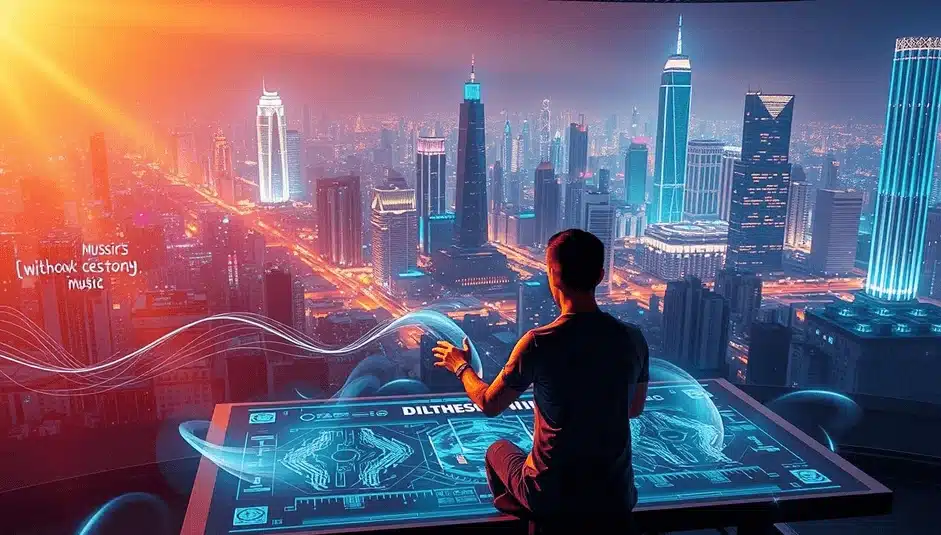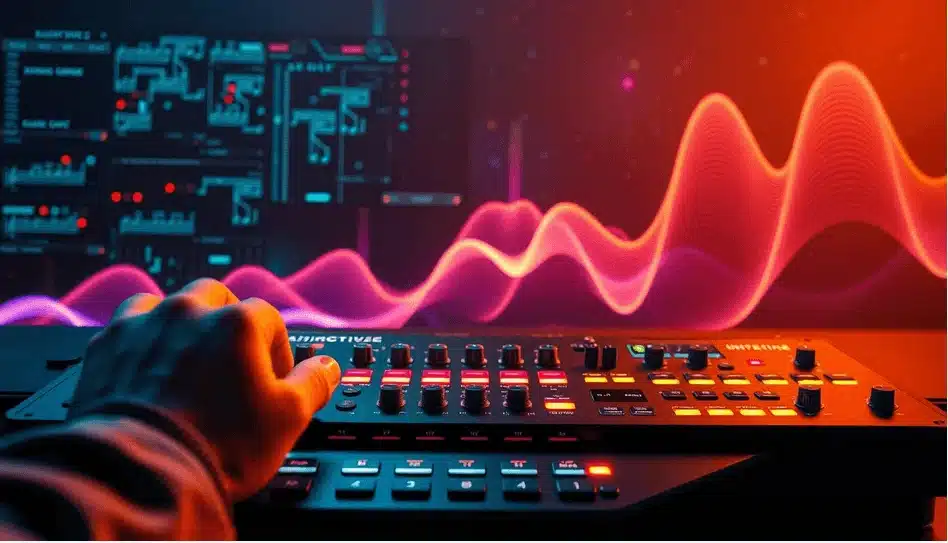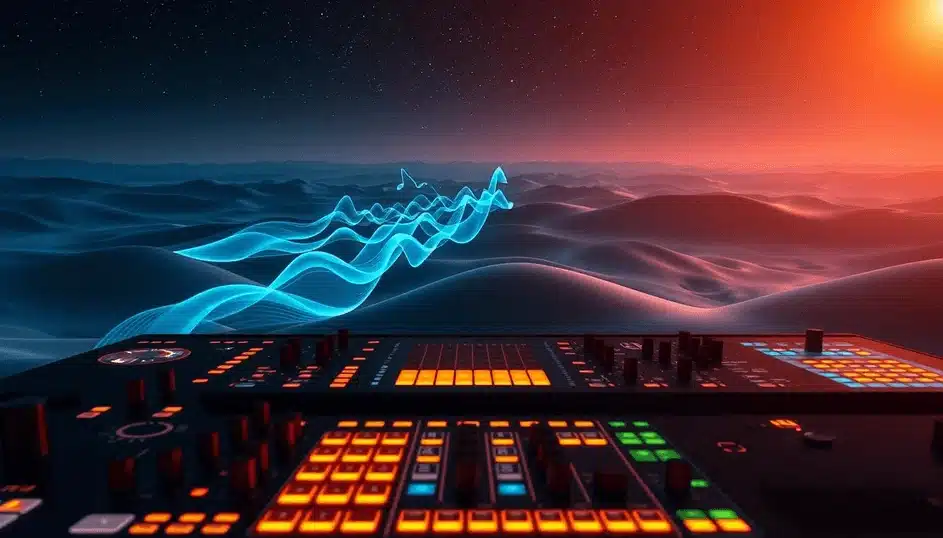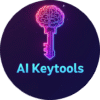Table of Contents
AI Music Tools That Help You Unleash Your True Musical Potential
Can technology and creativity merge to revolutionize the way we make music? The answer lies in the rapidly evolving world of Artificial Intelligence Music Tools, designed to empower artists and producers alike.
With the advent of music production AI and AI music creation, the boundaries of musical expression are expanding. These smart music technology innovations are not just tools; they’re collaborators that can inspire and enhance your creative process.

This article will guide you through the potential of AI in music production, exploring how these tools can transform your musical journey. Whether you’re a seasoned musician or an aspiring artist, understanding the capabilities of AI Music Tools can unlock new avenues for creativity.
Key Takeaways
• Discover how AI can enhance your music production process.
• Learn about the different types of AI Music Tools available.
• Understand the benefits of integrating AI into your creative workflow.
• Explore real-world examples of AI music creation.
• Get insights into the future of smart music technology
The Role of AI Music Tools in the Modern Evolution of Music Creation
The digital age has revolutionized music creation, offering artists unprecedented tools and capabilities. The journey from traditional instruments to sophisticated digital audio workstations (DAWs) and now to AI-driven music production tools has transformed the music industry in ways both subtle and profound.

From Traditional Instruments to Digital Audio Workstations
The evolution of music creation began with traditional instruments, where musicians relied on their skills and creativity to produce music. The advent of electronic instruments and recording equipment marked a significant shift, allowing for greater experimentation and innovation. The introduction of digital audio workstations (DAWs) further revolutionized music production, enabling artists to record, edit, and mix music with unprecedented precision and flexibility.
DAWs have become the cornerstone of modern music production, offering a range of tools and features that streamline the creative process. From virtual instruments to advanced editing capabilities, DAWs have empowered musicians to produce high-quality music without the need for expensive studios or extensive technical knowledge.
The AI Revolution in Music Production
The latest development in music creation is the integration of artificial intelligence (AI) into the production process. AI music software is capable of automated music composition, generating melodies, harmonies, and even entire tracks based on algorithms and machine learning models. This technology has opened up new possibilities for musicians, allowing them to explore fresh ideas and collaborate with AI as a creative partner.
Virtual music production tools powered by AI are changing the way music is created, produced, and consumed. These tools offer a range of benefits, from enhancing creativity to improving efficiency and reducing production costs. As AI technology continues to evolve, we can expect to see even more innovative applications in the music industry.
What Are AI Music Tools and How Do They Work?
The technology behind AI music tools is rooted in sophisticated algorithms and machine learning techniques. These tools are designed to assist musicians, producers, and composers in creating music with the help of artificial intelligence.
The Science Behind Artificial Intelligence Music Software
Artificial intelligence is transforming the music industry by providing innovative ways to produce, compose, and perform music. At the heart of AI music software are complex algorithms that enable machines to learn from data and generate new musical content.
Neural Networks and Music Pattern Recognition
Neural networks play a crucial role in Machine learning music tools. They are designed to recognize patterns in music data, such as melodies, harmonies, and rhythms. By analyzing these patterns, AI can generate new musical ideas that are coherent and contextually relevant.
How Machine Learning Transforms Sound Design
Machine learning algorithms can transform sound design by allowing AI to learn from vast datasets of audio samples. This enables AI music generators to create unique sounds and textures that can be used in various musical contexts.

The Core Components of Modern AI Music Systems
Modern AI music composers rely on several core components to function effectively. These include advanced algorithms, large datasets for training, and user interfaces that allow musicians to interact with the AI
| Component | Description | Functionality |
|---|---|---|
| Advanced | Complex mathematical formulas that enable AI to process and generate music. Pattern recognition, music generation | Pattern recognition, music generation |
| Large Datasets | Vast collections of music data used to train AI models. | Learning musical patterns, styles |
| User Interfaces | Software interfaces that allow users to input parameters and interact with AI. | Customization, control over AI output |
Types of AI Music Tools for Different Creative Needs
The integration of AI in music production has led to the development of specialized tools for composition, production, and sound generation. These AI music tools are designed to cater to the diverse needs of musicians, producers, and composers, enhancing their creative workflow.
AI Composition and Arrangement Software
AI composition and arrangement software have revolutionized the way music is created. Tools like Amper Music and AIVA use AI algorithms to generate musical compositions based on user inputs such as genre, mood, and tempo. These platforms can create complex musical pieces, from simple melodies to full-fledged orchestral arrangements, in a matter of minutes.
For instance, an ai song generator can produce a complete song, including melody, harmony, and rhythm, allowing artists to focus on other aspects of their music production. This not only saves time but also opens up new possibilities for creativity and experimentation.
Smart Music Production Assistants
Smart music production assistants are AI-powered tools that aid in various stages of music production, from beat-making to mixing and mastering. These assistants can analyze a track and suggest improvements, such as adjusting the EQ or adding effects to enhance the overall sound.
Some popular smart music production assistants include LANDR and BeatMaker. These tools integrate seamlessly with digital audio workstations (DAWs), providing a streamlined workflow for producers. By leveraging AI, these assistants can automate repetitive tasks, allowing producers to focus on the creative aspects of their work.
Virtual Instrument and Sound Generators
Top AI Music Generators for Beginners and Professionals
Free AI Music Generators Worth Trying
For those looking to explore AI music generation without financial commitment, there are several free tools available. These options provide a great starting point for beginners and hobbyists.
Web-Based Solutions for Quick Creation
Web-based AI music generators offer convenience and accessibility. Amper Music and AIVA are two popular platforms that allow users to create music quickly using AI algorithms. These tools are ideal for those who need to produce music on the go or want to experiment with different styles.
For developers and tech-savvy musicians, open-source AI music projects provide a deeper level of customization and control. Projects like Magenta (developed by Google) offer a range of AI music generation tools that can be integrated into various music production workflows.
Premium AI Music Creation Platforms
AI Song Makers: Creating Complete Tracks from Scratch
Melody Generation and Harmonic Structure
Beat Production and Rhythm Programming
| Feature | Description | Benefit |
|---|---|---|
| Melody Generation | Creates melodies based on style and genre | Innovative musical ideas |
| Harmonic Structure | Complements melodies with appropriate harmonies | Enhanced musical depth |
| Beat Production | Generates beats based on analyzed patterns | Unique rhythms and high-quality beats |
| Rhythm Programming | Creates complex rhythms tailored to the song | Engaging and dynamic musical compositions |
Enhancing Songwriting with AI Lyrics Generators
How AI Analyzes Language Patterns for Lyric Creation
Combining Human Emotion with AI-Assisted Writing
AI Music Composers: From Simple Tunes to Complex Arrangements
Classical and Orchestral Composition with AI
AI has made significant inroads in classical and orchestral composition. By analyzing the works of renowned composers, AI algorithms can generate pieces that echo the complexity and nuance of human-created masterpieces. For instance, AI systems can now compose symphonies that are virtually indistinguishable from those written by humans.
“The use of AI in music composition is not about replacing human composers but about augmenting their capabilities. AI can generate ideas, explore new sounds, and even collaborate with humans in the creative process.”
Dr. Anna Johnson, Musicologist
Genre-Specific AI Composition Tools
| Genre | AI Composition Features | Benefits |
|---|---|---|
| Classical | Orchestral arrangement, nuanced expression | Authentic classical compositions, collaboration with human composers |
| Electronic | Beat generation, melody creation | Quick production of electronic tracks, exploration of new sounds |
| Rock/Pop | Riff generation, chord progression | Catchy songwriting, inspiration for artists |
In conclusion, AI music composers are versatile tools that can handle a wide range of musical genres and complexities. Their ability to analyze, generate, and collaborate makes them invaluable assets in the music creation process.
Integrating AI Music Tools into Your Production Workflow
Compatibility with Popular Digital Audio Workstations
Cloud-Based vs. Local AI Music Solutions
Setting Up an AI-Enhanced Music Studio
To effectively integrate AI music tools into your production workflow, setting up an AI-enhanced music studio is crucial. This involves not only selecting the right AI tools but also configuring your studio to maximize their potential.
• Start by identifying the specific tasks you want AI to assist with, such as composition, sound design, or mixing.
• Choose AI tools that are compatible with your DAW and meet your creative needs.
• Configure your AI tools within your DAW, exploring their settings and capabilities.
• Experiment with different AI features, such as generating melodies, creating drum patterns, or designing unique sounds.
By thoughtfully integrating AI music tools into your studio, you can unlock new creative possibilities and enhance your music production process.
Overcoming Creative Blocks with Smart Music Technology
Using AI for Musical Inspiration and Ideation
Transforming Rough Ideas into Polished Productions
| Feature | AI Music Tools | Traditional Methods |
|---|---|---|
| Inspiration Generation | AI can generate new ideas based on vast databases | Relies on human creativity and experience |
| Production Assistance | AI can assist in arrangement, mixing, and mastering | Manual process requiring extensive knowledge and skill |
| Time Efficiency | AI can automate repetitive tasks, saving time | Time-consuming, manual processes |
By leveraging AI music creation tools, musicians and producers can not only overcome creative blocks but also enhance their overall production quality. As the music industry continues to evolve, embracing these technologies will be key to staying ahead of the curve.
Ethical Considerations and Copyright Issues in AI-Generated Music
Who Owns AI-Generated Music?
The issue of ownership is complex because music production AI systems can generate music that is often indistinguishable from that created by humans. This raises questions about authorship and the rights associated with AI-generated content.
• The developer of the AI might claim ownership due to their role in creating the algorithm.
• The user who inputs parameters and initiates the music generation process could argue they own the output.
• There’s also the possibility of considering the AI as the creator, though this is legally challenging as current laws do not recognize AI as a legal entity capable of holding rights.
The Future of Music Licensing in the AI Era
The Future of Virtual Music Production Tools
How AI Will Transform the Music Industry
Conclusion: Embracing AI as Your Creative Partner
AI music tools are software applications that utilize artificial intelligence, particularly machine learning algorithms, to assist in music creation, composition, and production. They analyze vast amounts of musical data, learn patterns, and generate new music or sounds based on that analysis.
